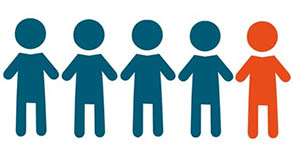Do you know someone with anxiety?
According to the National Institute of Mental Health, almost 1 in 5 people over the age of 18 have been diagnosed with an anxiety disorder. We want to understand the ways in which people with anxiety are different from people without anxiety. To do this, we recruit both anxious and non-anxious/healthy adults and children to participate in research studies. Even if you do not have anxiety, you can help someone who does.
You can help science move forward.
We are interested in studying human behavior and brain function, especially as they relate to anxiety. The more people that participate in research studies, the better we can understand how anxiety affects people in general. Each individual data helps us get a clearer picture of how the brain works and how anxiety affects people. By participating in research, you can feel good knowing you helped us answer important questions.
You can help us develop better treatments for people with anxiety.
If we understand anxiety better, then we can improve treatments and make them more effective. Some of our research investigates how treatments work, while some studies compare different ways of making people feel better.





